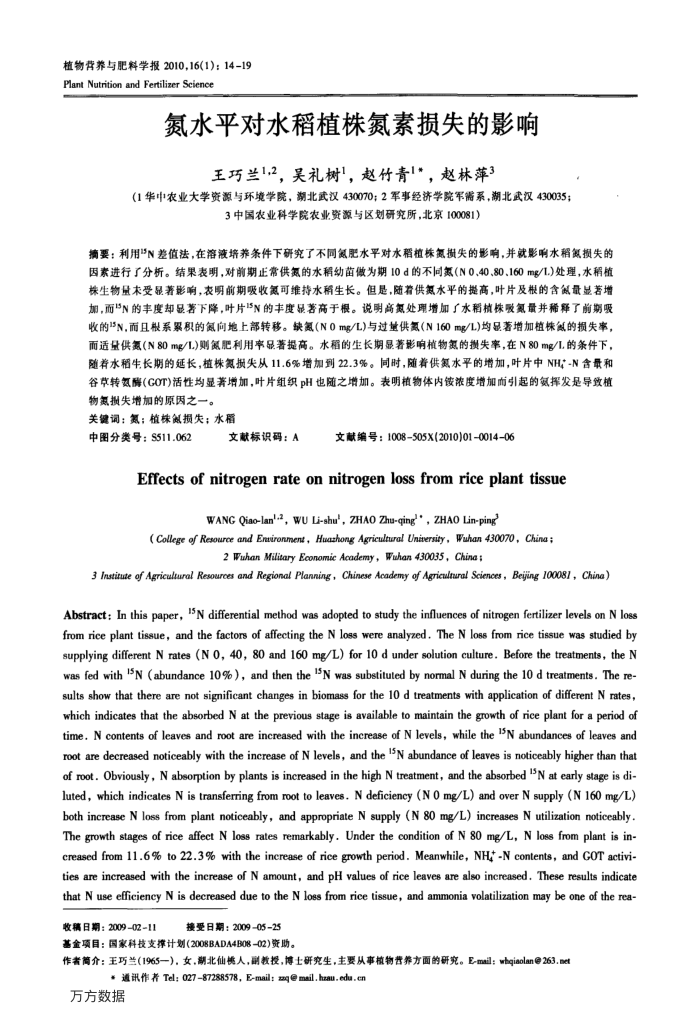您当前的位置:首页>论文资料>氮水平对水稻植株氮素损失的影响
内容简介
 植物营养与肥料学报2010,16(1):14-19 Plant Nutrition and Fertilizer Science
植物营养与肥料学报2010,16(1):14-19 Plant Nutrition and Fertilizer Science氮水平对水稻植株氮素损失的影响
王巧兰1,2,吴礼树1,赵竹青1,赵林萍3
(1华中农业大学资源与环境学院,潮北武汉430070;2军事经济学院军需系,潮北武汉430035;
3中国农业科学院农业资源与区划研究所,北京100081)
摘要:利用"N差值法,在溶液培养条件下研究了不同氮肥水平对水稻植株氮损失的影响,并就影响水稍氮损失的因素进行了分析。结果表明,对前期正常供氮的水稍幼苗做为期10d的不同氮(N0.40.80.160mg/L)处理,水稠植株生物量末受显著影响,表明前期吸收氮可维持水稍生长。但是,随着供氮水平的提高,叶片及根的含氮量显著增加,面"N的丰度却显著下降,叶片15N的丰度显著高于根。说明高氮处理增加了水稻植株吸氮量并稀释了前期吸收的"N,而且根系累积的氮向地上部转移。缺氮(N0mg/L)与过董供氮(N160mg/L)均显著增加植株氮的损失率,而适量供氨(N80mg/L)则氮肥利用率品著提高。水霜的生长期显著影响植物氮的损失率,在N80mg/L的条件下,随着水稻牛长期的延长,植株氮损失从11.6%增加到22.3%。同时,随着供氮水平的增加,叶片中NH4-N含量和谷草转氮酶(GOT)活性均显著增加,叶片组织pH也随之增加。表明植物体内铵浓度增加而引起的氮挥发是导致植物氮损失增加的原因之一
关键调:氮;植株氮损失;水霜
中图分类号:S511.062
文献标识码:A
文献编号:1008505X(2010)01-001406
Effectsofnitrogenrateonnitrogenlossfromriceplanttissue
WANG Qiao-lan'-2, WU Li-shu', ZHAO Zhu-qing'', ZHAO Lin-ping
( College of Resouree and Emuironment, Huazhong Agricultural Unitersity, Wuhan 430070, China;
2Wuhan Military Economic Academy,Wuhan 430035,Chine;
3 Institute of Agricultural Resourees and Regional Planning, Chinese Academy of Agricultural Sciences, Bejing 100081, Chine)
Abstract: In this paper, I5N differential method was adopted to study the influences of nitrogen fertilizer levels on N loss from rice plant tissue, and the factors of affecting the N loss were analyzed. The N loss from rice tissue was studied by supplying different N rates (N 0, 40, 80 and 160 mg/L) for 10 d under solution culture. Before the treatments, the N was fed with 15N (abundance 10% ), and then the '5N was substituted by normal N during the 10 d treatments. The re-sults show that there are not significant changes in biomass for the 10 d treatments with application of different N rates, which indicates that the absorbed N at the previous stage is available to maintain the growth of rice plant for a period of time. N contents of leaves and root are increased with the increase of N levels, while the I5N abundances of leaves and root are decreased noticeably with the increase of N levels, and the i5N abundance of leaves is noticeably higher than that of root. Obviously, N absorption by plants is increased in the high N treatment, and the absorbed i'N at early stage is di-luted, which indicales N is transferring from root to leaves. N deficiency (N O mg/L) and over N supply (N 160 mg/L) both increase N loss from plant noticeably, and appropriate N supply (N 80 mg/L) increases N utilization noticeably The growth stages of rice affect N loss rates remarkably. Under the condition of N 80 mg/L, N loss from plant is in-creased from 11.6 % to 22.3% with the increase of rice growth period. Meanwhile, NHt -N contents, and GOT activi-ties are increased with the increase of N amount, and pH values of rice leaves are also increased, These results indicate that N use efficiency N is decreased due to the N loss from rice tissue, and ammonia volatilization may be one of the rea
收稿日期:2009-02-11
接受日期:20090525
基金项目:国家科技支撑计划(2008BADA4B08-02)资助。
作者简介:王巧兰(1965—),女,湖北仙概人,副教投,博士研究生,主要从事核物营养方面的研究。E-mail:wbqiaolan@263.net
通讯作者Tel;02787288578,E-mail:zzq@mail.hzau.edu.en
万方数据